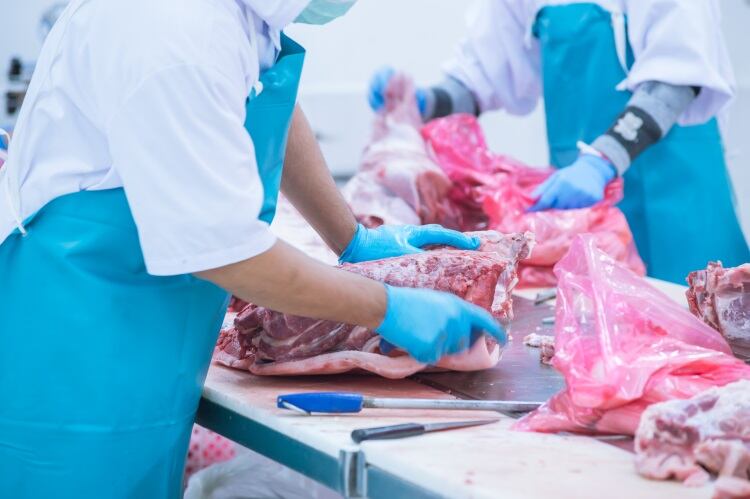Billed as a ranch to table operation, with about 30,000acres of organic ranchland, Belcampo farms seven species that are processed in its USDA-approved slaughterhouse a short drive away.

The business manages its own supply chain, including its consumer-facing operations, with the quality product for a quality price ethos. “The meat that we farm, which we do regeneratively, is commercialised through our own restaurants, and our goal is to offer consumers a meat choice that they feel amazing about,” explains Fernald. “A meat choice that is absolutely pinnacle in all of the attributes - how the animals are raised; how they're processed; humane handling; evolutionary diet which is grass-fed and pasture-finished are all things we pay a lot of attention to.
Of course, this ethos has its drawbacks. “We are incredibly slow. Our time to raise species is almost double what a commercial operation takes. We're raising them free-range, lots of exercise and movement, a very low nutrient density diet, no antibiotics, no hormones. It's a different style of production. The meat that we produce looks different, tastes different, our customers really appreciate that.”
The additional time and effort put into the product is something that Fernald believes is valued by customers. “I'd say there is broadly, among a certain segment of the population, a mistrust of the meat system and we're trying to position ourselves as a meat that is different for those that are willing to pay for it. That's key, our products are typically priced at least 10% higher than the highest item in the grocery store.
"We don't get a lot of push-back on price. In the current circumstances, with Covid, there's been a lot of concern about wellness. We're considered a high value, high integrity brand. In the US, there aren't many vertically integrated brands with full traceability.”
Coronavirus impact
The coronavirus has had a serious impact on numerous plants in the US but Fernald said they’ve managed to avoid any disruption in production but rather had to switch up the product mix. “Production has been totally uninterrupted. There was a run in the supermarket so we're short on a few lines such as organic lamb. Some basic wiggles here and there but broadly no changes to doing business. We've put in a lot of overtime, our slaughterhouse from 15 March, we were aware was essential to the company's survival.
“We were extremely proactive on aggressive measures and haven't had any positive cases, and no issues in our supply chain so have been cranking out product. We've been shipping about five times typical volumes to satisfy needs.
“The mix has changed as well. Our restaurants have closed but are selling raw meats and product delivery. Our retail partners are up and our e-commerce has been through the roof.”
A lot has been made about carcase balance issues facing processors due to the fact that restaurants aren’t open so the higher-value cuts are less in demand. Fernald said this is nothing new for Belcampo. “Carcase balance is the challenge of my life. We market whole animals so we've always had that problem. In this particular crisis, the fact that we're omni-channel has helped us.”
As well as the move away from food service, Fernald also explains how consumers have embraced digital for purchasing meat. “Our app before coronavirus had 2,000 users, now we're close to 15,000 people, and more than a third of transactions are happening through the app.”
Fernald is obviously focusing on her business during these tricky times but would like to see more in the industry embrace Belcampo’s ethos, even if she understands why they wouldn’t.
“My vision is to be an agent of change in the industry. I think consumers want more transparency. They're concerned about how animals are treated, they're concerned about how the planet is impacted by agriculture. I don't believe the propaganda from the other side about how bad it is but I do think there is an opportunity to use livestock as an agent of positive change.
“Our farm is carbon impact negative, we sequester carbon on a beef ranch. That's what consumers would like to see more of. The problem is that, we've been at this for eight years, and it's extremely costly and complicated. Everyday I seem to find reasons why nobody does it this way on a larger scale but there is a consumer demand for it. I think a lot of consumers are turning vegan or choosing to leave meat behind because they're not getting the answers they'd like to see. But if you give them the answers and the choice, they're willing to try meat again.”
Future plans
Looking ahead, what else has Belcampo got planned for the future? “We are expanding into more retail. We are looking at selling into more grocery stores. We're committed to 25 more stores over the summer. And we're expanding our partner farm programme. Our vision is to grow our supply chain via strategic partnerships.
"I dream of a day where we grow from 30,000 acres of managed land to 200,000 acres that we're supporting with regenerative practices.”


